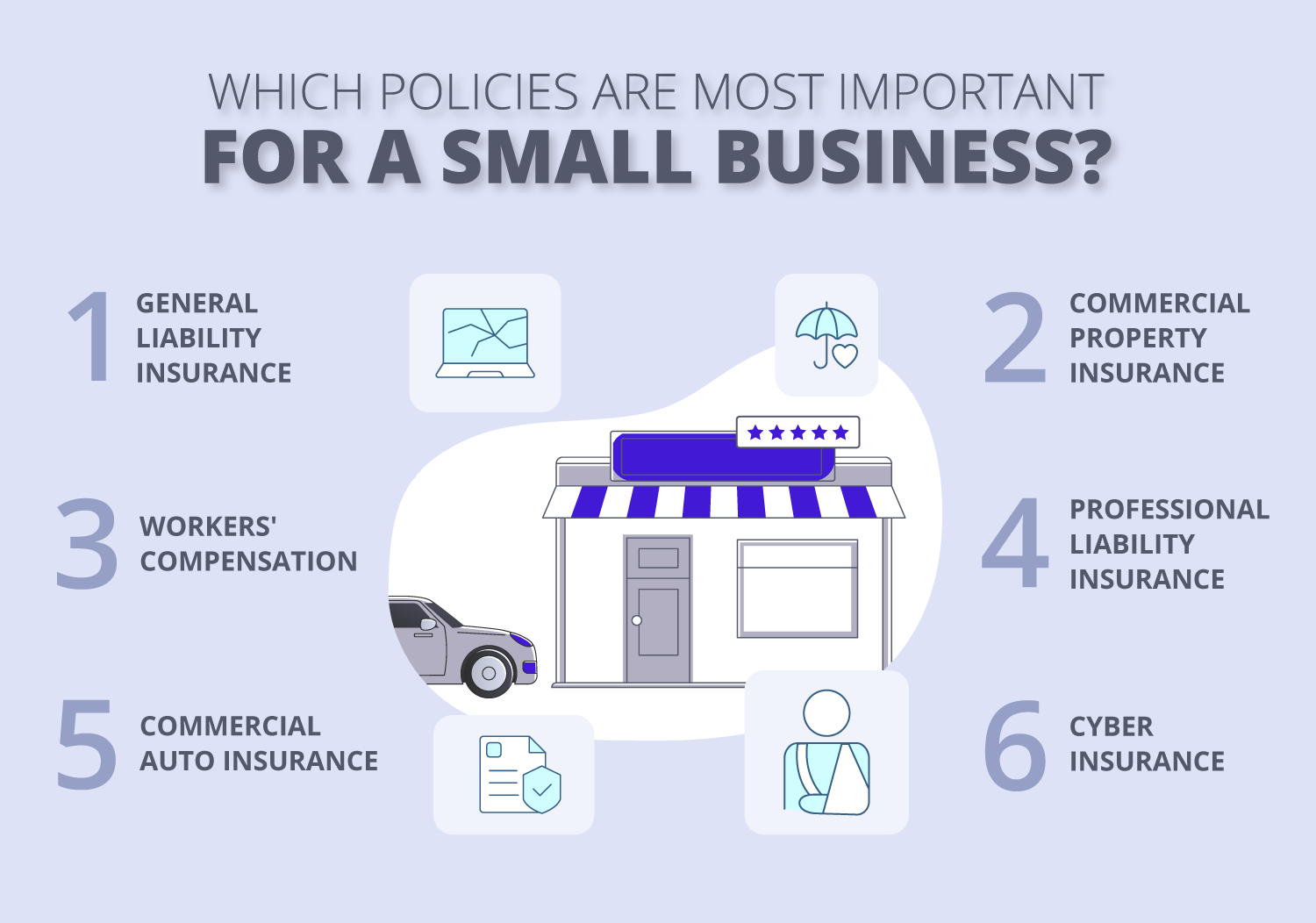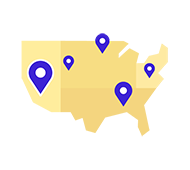
Find the right commercial insurance for your small business


What is commercial insurance?
Commercial insurance, also known as business insurance, financially protects your business from common risks such as client lawsuits, customer or employee injuries, property theft and damage, as well as other unexpected events.
There are two main types of commercial insurance. Commercial property insurance helps pay for business property damage or loss, and business liability insurance helps cover the cost of lawsuits brought against your business. Other insurance products and coverage options are available to address industry-specific risks.
Commercial insurance is a great safeguard for protecting your personal finances as well as your business investment. It can sometimes be required by state law, or to obtain a contract or lease. Most importantly, by choosing the right coverage and risk management plan you can protect yourself against most of the common liabilities that small businesses face and avoid financial loss.
What are the most common types of commercial insurance?
General liability insurance
Commercial general liability insurance covers common third-party risks, such as customer injuries, customer property damage, and advertising injuries. It’s often required for leases and contracts.
- Client accidents and injuries
- Damage to customer property
- Advertising injury lawsuits
Business owner’s policy
A BOP bundles commercial property insurance and general liability insurance in one plan. It’s often the most cost-effective type of business insurance for small businesses.
- Customer bodily injuries
- Damaged business property
- Business interruption incidents
Workers’ compensation insurance
Workers’ compensation insurance is required in almost every state for businesses that have employees. It can cover medical costs for work-related injuries.
- Employee medical expenses
- Disability benefits
- Lawsuits from work injuries
Commercial auto insurance
Commercial auto insurance covers your company-owned commercial vehicles in the event of accidents or injuries, as well as theft, vandalism, and other damages.
- Car accidents
- Vandalism and theft
- Weather damage
Professional liability insurance
This policy can help cover legal expenses if a business is sued for professional negligence. It's also called errors and omissions insurance (E&O).
- Mistakes and oversights
- Undelivered work or services
- Advice that causes financial loss
Commercial property insurance
A commercial property policy covers the value of a business's physical structure and its contents, such as inventory, equipment, and furniture.
- Fire
- Vandalism and theft
- Windstorms
Errors and omissions insurance (E&O)
This policy is also called professional liability insurance. It covers legal expenses if a client sues your business over unsatisfactory results, errors, or delayed work.
- Work errors and oversights
- Accusations of negligence
- Missed deadlines
Cyber insurance
Cyber insurance protects your small business against the financial impact of data breaches and cyberattacks. It's sometimes called cyber liability insurance or cybersecurity insurance.
- Data breach lawsuits
- Client notification expenses
- Fraud monitoring costs
Commercial umbrella insurance
Umbrella insurance provides additional coverage once another policy's limit is reached. It boosts coverage on your existing general liability insurance and other liability coverages.
- Accidents that injure customers
- Multi-vehicle auto accidents
- Negligence in workplace safety

How much does commercial insurance cost?

Commercial insurance is typically quite affordable, particularly for low-risk industries. These are the average monthly costs for the top insurance policies:
General liability insurance: $45 per month
Professional liability / E&O: $61 per month
Workers' comp: $54 per month
Business insurance costs are calculated based on a few different factors, including:
- Number of employees
- Industry risk
- Policy limits
- Business income
- Claims history
Verified business insurance reviews
Hear from customers like you who purchased small business insurance.
What kinds of businesses need commercial insurance?
Any small business owner could benefit from commercial insurance, including independent contractors and freelancers. Accidents, lawsuits, and injuries can happen in any workplace, which is why it's important to secure protection even when insurance isn't required by law.
While all small businesses would benefit from having insurance, a company's insurance needs will vary based on the type of business.
For example, small businesses that work with expensive equipment or sensitive medical information may want to consider additional coverages, such as tools and equipment insurance or medical malpractice coverage.
How do I get commercial insurance for my business?
Insureon is the #1 digital business insurance agency. Our streamlined process helps you find coverage from top U.S. carriers for your specific risks at an affordable rate.
Contact Insureon's licensed insurance agents. The agent can discuss insurance options based on your business needs and provide quotes for policy premiums. You can speak with your agent about the costs of insurance, as well as any questions you have about the different types of policies available.
If you already know what kind of insurance you need, you can fill out Insureon's free online application to get quotes from top-rated insurers. You can buy coverage online and get a certificate of insurance usually within 24 hours.
Product liability insurance
Medical malpractice insurance
Tools and equipment insurance
Builder's risk insurance
Liquor liability insurance
Business interruption insurance
Management liability insurance
FAQs about commercial insurance
Review answers to frequently asked questions about commercial insurance.
How do I decide which commercial insurance coverage I need?
A licensed agent can help you find the right insurance solutions, including how much coverage your company needs based on your business type, the amount of business personal property you have, and other factors. You'll need to ensure your coverage meets any requirements set by state laws, your clients, or your industry.
Read more about what types of insurance you might need.
What is the difference between commercial and personal insurance?
The difference between personal and commercial insurance can get confusing, especially when they both cover things like bodily harm and injury. So, what's the difference?
Commercial insurance covers accidents, mishaps, and other incidents that occur while working, using company property, and on the job site. Personal insurance covers everything else.
If your business property, employee, or client experiences an accident, injury, problem, or event during business operations, it will be covered by commercial insurance. Many types of insurance cover different aspects of running a business, such as commercial automotive insurance, commercial property insurance, and even data breach insurance.
Personal insurance covers non-work related accidents, illnesses, and injuries, such as a cold or flu or a broken arm from a fall at home. There are non-medical types of personal insurance as well, including personal auto, life, and homeowner's property insurance.
What types of commercial insurance are required in my state?
Each state has different requirements for the types of insurance required for small businesses. Common types of required insurance include workers' compensation insurance and commercial auto insurance.
Certain industries, such as real estate and construction, may have additional insurance requirements based on where they operate. To get an idea of your state's unique insurance requirements, enter your state below.
Find business insurance requirements in your state

What happens if I need to file a claim?
Contact your insurance provider. They will investigate your commercial insurance claim, assess the damage, and inform you of the next steps. If your claim is approved, it will be subject to any out-of-pocket deductible and coverage limits included in your policy.
If someone sues you for financial damages covered by your insurance, your insurance provider will likely connect you with an attorney to represent you in court or settle a property or liability claim.

When buying small business insurance, it’s important to choose reputable insurance companies. The following are some of the best providers for the most necessary and affordable types of business insurance coverage.


